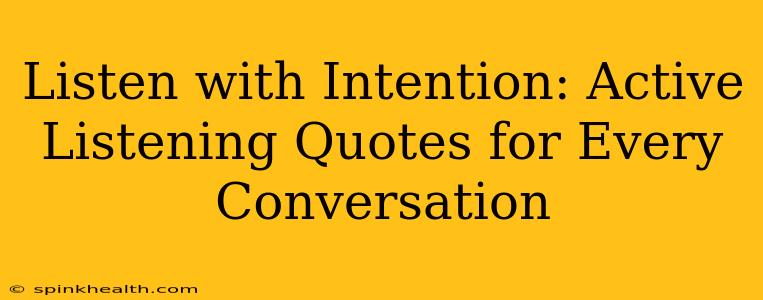In today's fast-paced world, truly listening—actively listening—is a rare and valuable skill. It's more than just hearing words; it's about understanding the speaker's emotions, perspectives, and unspoken messages. Active listening fosters stronger relationships, improves communication, and resolves conflicts more effectively. This post delves into the power of intentional listening, exploring insightful quotes and practical applications to elevate your conversations.
What is Active Listening?
Active listening is a conscious and focused effort to fully understand the speaker's message. It involves more than just hearing the words; it requires paying attention to nonverbal cues like body language, tone of voice, and even silences. It’s about engaging with the speaker on an emotional level, showing empathy, and responding thoughtfully. The goal isn't to formulate your response while the other person is speaking, but to truly grasp their meaning before contributing your own thoughts.
The Power of Active Listening Quotes
Many insightful individuals have highlighted the importance of active listening. Here are some powerful quotes that encapsulate the essence of this critical skill:
-
"The most basic of all human needs is the need to understand and be understood." - Ralph Nichols This quote underscores the fundamental human desire for connection and validation, highlighting the role of active listening in fulfilling this need. When we listen actively, we demonstrate understanding and create a space for genuine connection.
-
"Most people do not listen with the intent to understand; they listen with the intent to reply." - Stephen R. Covey This is a poignant observation about the common communication trap of focusing on our own response rather than truly understanding the speaker. Intentional listening requires shifting our focus from ourselves to the other person.
-
"Listening is a magnetic and creative force." - Frank Tyger This quote emphasizes the transformative power of active listening. When we genuinely listen, we create a positive and engaging atmosphere that fosters collaboration and understanding. It's a force that draws people together and sparks creativity.
Frequently Asked Questions about Active Listening
How can I improve my active listening skills?
Improving active listening is a process that requires conscious effort and practice. Here are a few key strategies:
- Minimize distractions: Put away your phone, find a quiet space, and focus your attention entirely on the speaker.
- Pay attention to nonverbal cues: Observe body language, facial expressions, and tone of voice to gain a deeper understanding of the message.
- Ask clarifying questions: Don't hesitate to ask questions to ensure you understand the speaker's perspective. This shows engagement and a desire to understand.
- Summarize and paraphrase: Periodically summarize the speaker's points to confirm your understanding and ensure you're on the same page.
- Practice empathy: Try to see things from the speaker's point of view, even if you don't agree with their perspective.
What are the benefits of active listening?
The benefits of active listening are far-reaching, impacting both personal and professional relationships:
- Stronger relationships: Active listening fosters trust, empathy, and deeper connections.
- Improved communication: Clearer understanding prevents misunderstandings and conflicts.
- Increased productivity: In professional settings, active listening leads to better collaboration and problem-solving.
- Conflict resolution: By fully understanding the other person's perspective, you can find common ground and resolve disagreements more effectively.
Is active listening the same as passive listening?
No, active and passive listening are vastly different. Passive listening involves simply hearing the words without engaging mentally or emotionally. Active listening, conversely, is a conscious and engaged process that requires full attention and participation.
Conclusion: The Art of Truly Hearing
Active listening isn't just a skill; it's an art. It's about cultivating a mindful approach to conversation, valuing the speaker's perspective, and creating space for genuine connection. By incorporating the principles of active listening into your daily interactions, you'll significantly enhance your relationships, improve communication, and experience the transformative power of truly hearing. Remember the quotes, practice the techniques, and discover the profound impact of listening with intention.

